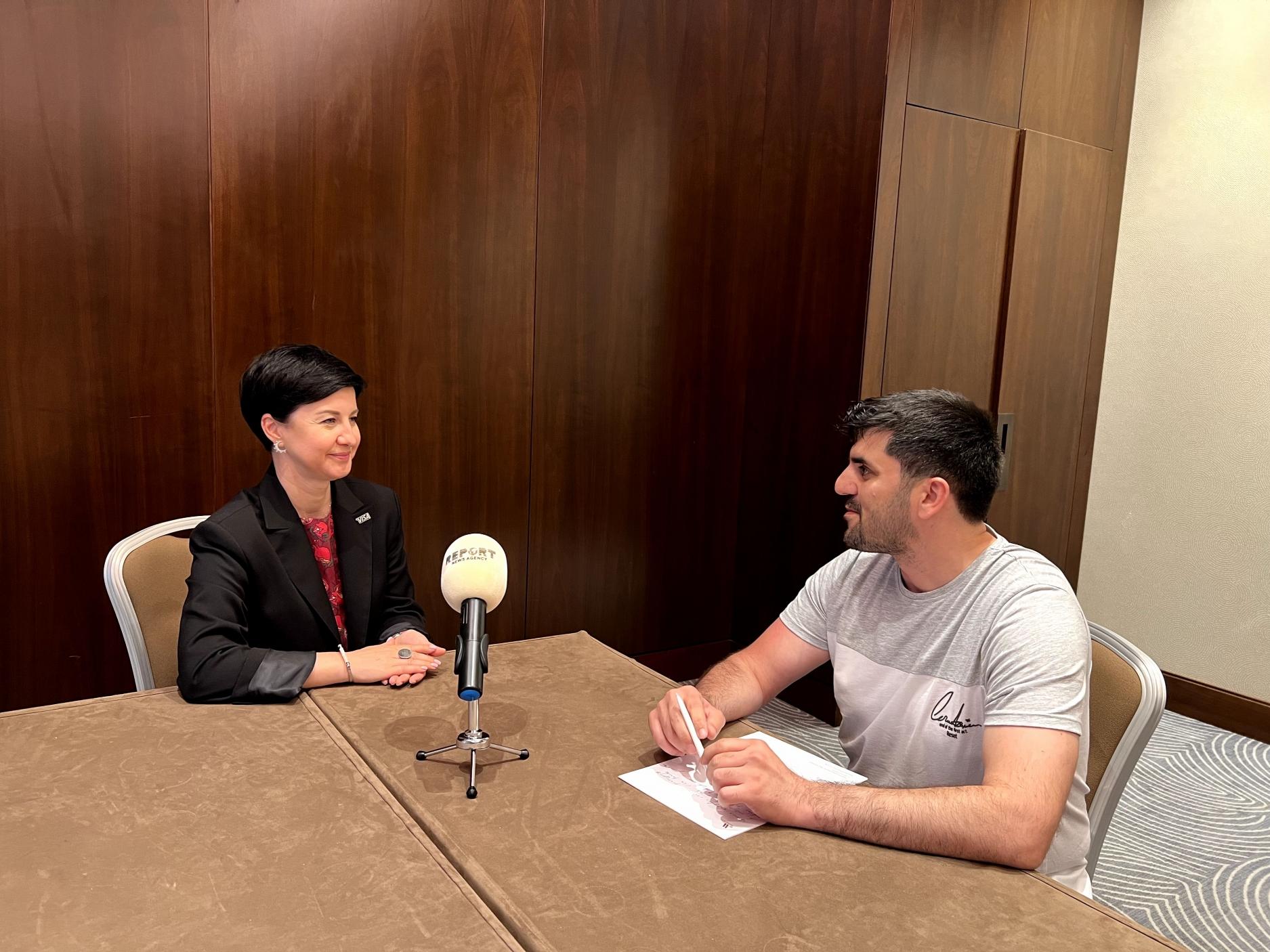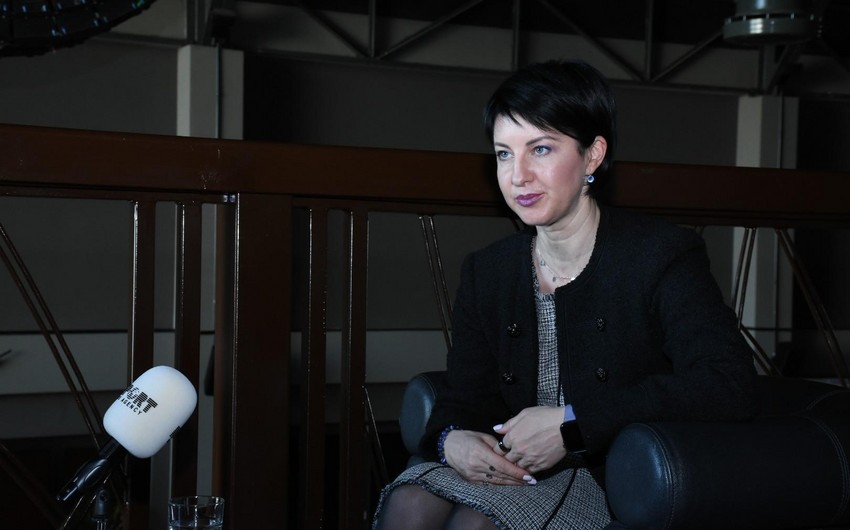Report presents interview with Cristina Doros, vice president, Visa country manager for Central Asia and Azerbaijan
- In cooperation with the Central Bank of Azerbaijan, Visa is implementing a digital payments strategy. What are the first results?
- We are sincerely pleased with the level of cooperation that the Visa team has established with the Central Bank of Azerbaijan. I want to emphasize that the CBA employs a team of professionals, experts who deeply understand the market and know the technology. They are building a foundation in the form of proper regulation, which allows digital payments and a cashless economy to develop qualitatively and quickly.
One of the main goals of the CBA and Visa, among other things, is the development of a cashless economy in the country and the transition to digital payments. This approach has huge advantages. For example, high transparency of payments, replenishment of the budget, the possibility of increasing the level of social payments, etc.
Therefore, we are very actively cooperating with the Central Bank, and the strategy of digital payments for a cashless economy for 2021-2023 is already working.
It can already be stated that one of the main results that we were able to achieve in Azerbaijan was the possibility of paying with mobile devices. Such payments are based on the Visa Token Service tokenization technology introduced in 2019.
This launch was the result of the work of the Central Bank, which created the necessary regulatory conditions for the emergence of innovations.
Tokenization has enabled banks to create their own digital wallets and issue digital cards. The foundation laid by this technology allowed ApplePay and GooglePay to start providing their services to the Azerbaijani market. Now any citizen of the country can take their Visa card, link it to these payment services and make payments using smartphones, smart watches or, for example, a payment ring, which is very convenient.

It is already difficult for a person who started paying with a smartphone to return to a plastic card. The phone is almost always with us, besides, on modern smartphones you don’t even need to enter a PIN code - the device performs identification using biometric data. For example, Face ID or Touch ID.
The rate of penetration of tokenized payments into the market in Azerbaijan far exceeds the rate in other countries. Azerbaijani citizens are much more willing to use new technologies, and there are many such examples.
- Is it possible to expand joint projects? How many years is the extension planned for?
- Colleagues from the CBA have their own plans for the further stages of development of Azerbaijan’s cashless economy, and Visa, for its part, will always be a trusted partner of the regulator in the implementation of all strategic directions.
In general, the work is carried out as planned, but sometimes technology may appear that was not included in our plans, but its implementation is expedient, which is being done.
- In Azerbaijan, the government is taking steps to make transport completely cashless. What can Visa offer in this direction?
- This is a very important issue, because in the modern development of ‘smart cities’ transport is a key structure. This allows paying for trips in any type of transport with a bank card, smartphone, smartwatch, etc. quickly, conveniently and safely. This is especially true for guests of Baku.
Visa has accumulated vast experience in this area. Perhaps, many have heard that the world record holders for the development of transport systems are London, Toronto and, by the way, Kyiv, where contactless payments are also actively introduced in transport. We certainly use this experience in Azerbaijan.
For example, contactless payments have been launched on Azerbaijan’s Baku-Sumgait ring railway. We are now discussing with the relevant structures the possibility of deploying this system as widely as possible.

Azerbaijan is open to the introduction of innovations. For example, last year Visa launched Mobility & Transit Transaction (MTT) technology for the first time in a country and region of 17 countries that includes Georgia, Ukraine, the CIS and Southeast Europe. It allows combining 24-hour public transport fares into one transaction, which is charged in a single payment at the end of the day. Now the service has been launched at all 14 stations of the Baku Ring Route, equipped with turnstiles with readers for receiving contactless payments.
MTT technology makes it possible to combine all elements of the transport infrastructure into one. For example, in the morning you can leave your house, take a bus to the metro station, use this transport, then go to Sumgait by train, and return at the end of the day. For the entire cycle of the transport chain, you will be charged the amount of payment for all your trips in the evening. In addition, this technology allows transport operators to introduce flexible pricing for tickets and apply any kind of discounts and transfer rates.
This is a very interesting system that allows significantly optimizing cash flows within transport systems, get rid of fraud attempts, payment evasion, and so on. Now we are conducting a dialogue with interested structures about the possibility of using this approach in Azerbaijan. The question depends on very many elements in this infrastructure, but we are actively working on it.
- Recently, cases of fraud with bank cards by cybercriminals have become more frequent. How is the fight against them going?
- In the real world, when we use a card or phone to pay, fraud is, in fact, almost impossible. The system is designed in such a way that it cannot be hacked. The tokenization system also works with the maximum level of protection against fraudsters.
At the same time, we understand that with the transition of a large number of businesses and payments to the online environment, the opportunities for fraudsters also increase. Visa pays great attention to this. For us, cybersecurity issues are the cornerstone; our entire strategy is built around it.
Over the past five years, Visa has invested $9 billion in anti-fraud and fraud monitoring systems, including those based on artificial intelligence technologies.
These are the systems within Visa that allow us to protect our VisaNet from hacker attempts, and we are doing this very successfully. We also provide anti-fraud solutions to our partners.
If I had been asked 10 years ago with whom Visa works in Azerbaijan, the answer would have been - with banks. But the market is rapidly changing, now we work with almost all representatives of the financial sector in the country, including fintech and the public sector.

- How does the closure of commercial banks affect the activities of Visa in our country?
- We are monitoring the situation on the market, but these issues are under the jurisdiction of the CBA. Azerbaijan, like other countries, has its own regulation that defines the rules. So, this is a given of the market that we work with. We have a standard process for accepting and withdrawing banks from the system. Therefore, I cannot say that it greatly affects our work.
Of course, we want the number of Visa partners to grow, and we are taking all measures to ensure that new banks that appear also become members of our system.
- Instead of increasing the use of virtual cards in the digital age, some banks have canceled them. What is the reason? Is it possible to completely abandon physical cards in the near future?
- Previously, when technologies were not yet so developed, there was such a type of cards as virtual ones. At that time, it was a good solution for those customers who only want to use those cards for online transactions. In this case, there was no physical card - the bank simply issued a card number account, using which it was possible to carry out transactions online.
Today the situation is different - most banks have convenient mobile applications that allow managing own purchases, including on the Internet, as well as set limits and carry out other operations. That is, a person can use the main card, both in digital form and in the form of plastic, for online purchases.
Returning to the issue of plastic - in fact, a complete rejection of it is quite possible. For a while, some people will still use physical cards, because they are just used to paying with them.
But, probably, over time, we will stop using plastic, as it is much more convenient to use smartphones and other devices for payment. I repeat that people who have at least once tried to pay with a smartphone are unlikely to return to physical cards.

- What can you say about artificial intelligence in the financial sector?
- It has a huge potential for processing the accumulated mass of data. I have already mentioned Visa’s investment in cybersecurity and AI in particular. Our network is already using artificial intelligence to prevent fraudulent transactions.
For example, you have been paying with your bank card in Azerbaijan all your life, but you have never paid with it abroad. If one day the system sees that you paid for the purchase in another country, it will automatically notify the bank of a suspicious transaction. The bank will contact you, and if it is confirmed that you made a purchase, they will approve it. If not, they will take steps to secure your money.
How these technologies will evolve and impact our lives remains to be seen.


 https://static.report.az/photo/debb7346-10db-3e0f-a03f-d3de05421786.jpg
https://static.report.az/photo/debb7346-10db-3e0f-a03f-d3de05421786.jpg

